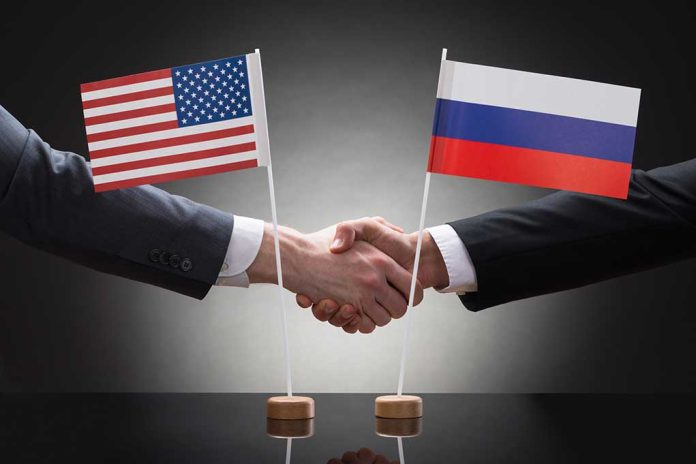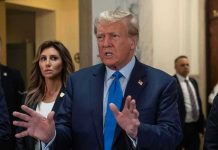
President Trump and Vladimir Putin reach a limited ceasefire agreement on Ukraine, setting stage for historic Middle East peace talks.
Key Takeaways
- Putin agreed to a 30-day halt on attacks against Ukraine’s energy infrastructure following direct talks with President Trump.
- Both leaders will meet in the Middle East for peace negotiations focused on establishing an energy infrastructure ceasefire and a maritime ceasefire in the Black Sea.
- Putin rejected a broader ceasefire proposal, citing concerns Ukraine might use the truce to rearm with Western support.
- Ukrainian President Zelenskyy cautiously welcomed the initiative while warning of potential Russian delay tactics.
- The diplomatic breakthrough represents a significant effort to improve US-Russia relations and potentially impact conflicts in both Ukraine and Gaza.
Breakthrough in US-Russia Relations
In a significant diplomatic development, Russian President Vladimir Putin has agreed to suspend attacks on Ukraine’s energy infrastructure for 30 days following direct communication with US President Donald Trump. The partial ceasefire agreement came after a phone conversation between the two leaders, representing the first tangible step toward potential peace in the region since the conflict began. Both leaders acknowledged the necessity of ending the hostilities in Ukraine with a lasting peace agreement, marking a potential turning point in what has been a devastating war.
While Putin accepted the limited energy infrastructure ceasefire, he declined to embrace a broader US-backed proposal for a complete 30-day cessation of hostilities. According to reports from multiple sources, the Russian leader expressed concern that Ukraine might use any comprehensive truce as an opportunity to mobilize and rearm with continued Western military assistance. Putin emphasized that stopping foreign military aid and intelligence support to Kyiv remains crucial for any meaningful conflict resolution.
🚨 Readout of President Donald J. Trump's Call with President Vladimir Putin:
"This conflict should never have started and should have been ended long ago with sincere and good faith peace efforts. The leaders agreed that the movement to peace will begin with an energy and… pic.twitter.com/H7w7FjWDc3
— Trump War Room (@TrumpWarRoom) March 18, 2025
Middle East Peace Talks
The White House confirmed that extended peace negotiations are set to begin immediately in the Middle East, chosen as neutral ground for these critical discussions. The talks will initially focus on two key objectives: formalizing the energy and infrastructure ceasefire and establishing a maritime ceasefire in the Black Sea. These strategic priorities address some of the most destructive aspects of the conflict, with Russian attacks on Ukraine’s energy systems having caused widespread power outages affecting millions of civilians.
The diplomatic initiative represents a potential restoration of meaningful dialogue between Washington and Moscow after years of deteriorating relations. Both Trump and Putin reportedly expressed mutual interest in improving bilateral relations between the United States and Russia, which have reached historic lows in recent years. According to reports, the leaders also discussed the ongoing conflict in Gaza during their conversation, with both expressing support for Israel.
Ukrainian and International Response
Ukrainian President Volodymyr Zelenskyy has expressed cautious openness to the US-brokered proposal while simultaneously warning about Moscow’s potential intentions to delay meaningful negotiations. In public statements, Zelenskyy urged international allies to maintain pressure on Russia toward achieving a comprehensive peace deal while rejecting any suggestions of suspending military aid to Ukraine. This reflects ongoing concerns in Kyiv that any partial agreements might solidify Russian territorial gains.
European leaders have offered varied responses to this diplomatic development. Outgoing German Chancellor Olaf Scholz and other NATO allies have publicly supported Ukraine while calling for a complete ceasefire rather than the limited arrangement currently on the table. Al Jazeera reported significant skepticism from Kyiv regarding the limited scope of the proposal, though some observers noted this represents the first substantial diplomatic momentum from the Kremlin in many months.
The Russian suspension of attacks on energy infrastructure comes at a critical time as Ukrainian civilians face increasing hardship from widespread power outages. Simultaneously, Ukrainian forces have conducted their own strikes against Russian refining capacity, creating a complex situation where both sides have strategic interests in protecting critical infrastructure. The proposed maritime ceasefire in the Black Sea would also address crucial shipping routes that impact global food security.
As these developments continue to unfold, the timing and location of the Middle East peace talks remain under close observation by international observers. With both leaders committing to this diplomatic path, the coming weeks will reveal whether this initiative represents a genuine turning point or merely another chapter in the protracted conflict.
Sources:
Putin Agrees to Pause Attacks on Ukraine Energy Infrastructure in Call With Trump
Russia’s Putin agrees to 30-day halt in attacks on Ukraine energy targets
Trump and Putin to meet in the Middle East for Ukraine peace talks



